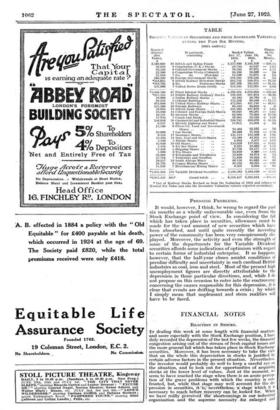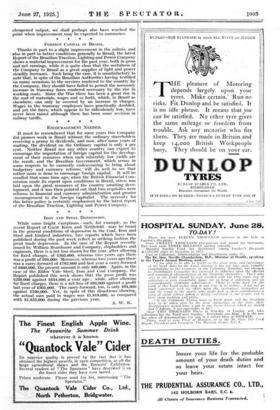FINANCIAL NOTES
R FACTION Ix STOCKS.
TN dealing this week at some length with financial matters, and more especially with the Stock Exchange position, I have duly recorded the depression of the last few weeks, the financial congestion' arising out of the stream of fresh capital issues and the-more general-fall which-has-taken place in-Stock Exchange securities. Moreover, it has been necessary to take the view that on the whole this depreciation in stocks is justified by certain adverse factors in the present situation. Nevertheless, the investor would probably do well to keep a careful eye on the situation, and to look out for opportunities of acquiring stocks at the lower level of values. Just at the moment, we seem to have reached the stage when there is an acute percep- tion of the grave problems with which the country is con' fronted, but, while that stage may well account for the de- pression in securities, it lis;. nevertheless; a' stage which it is necessary to reach. before recovery can be looked for.. When we have rally perceived the shortcomings- in our industrial organization and the supreme necessity for enlarged and
cheapened output, we shall perhaps also have reached the point when improvement may be expected to commence.
* * FOREIGN CAPITAL IN BRAZIL.
Thanks in part to a slight improvement in the milreis, and also in part to better conditions generally in Brazil,- the latest Report of the Brazilian Traction, Lighting and Power Company shows a material improvement for theyast year, both in gross and net earnings, while it is quite clear that the usefulness of the Company to Brazil as a great supplier of light and power steadily increases. Such-being the case, it is unsatisfactory to note that, in spite of the Brazilian Authorities having testified on many occasions to the services rendered to the country by the Company, they should have failed to permit the necessary increase in tramway fares rendered necessary by the rise in working. costs. Since the War there has been a great rise in the cost of materials, wages and so forth, which, in Brazil as elsewhere, can only be covered by an increase in charges. Wages to the tramway employees have practically doubled, and yet the fares, which appear to be ridiculously low, have never been raised although there has been some revision in railway tariffs.
* *
ENCOURAGEMENT NEEDED.
It must be remembered that for some years this Company did pioneer work in Brazil with6ut the ordinary shareholders receiving a penny in dividends, and now, after some years of waiting, the dividend on the Ordinary capital is only 4 per cent. Neither Brazil nor any other country can expect to encourage the importation of foreign capital for the develop- ment of their resources when such miserably low yields are the result, and the Brazilian Government, which seems in some respects to be earnestly endeavouring to bring about budgetary' and currency reforms, will do well to see that rather more is done to encourage foreign capital. It will be recalled that some time ago, when the British Financial Com- mission made its report upon conditions in Brazil, stress was laid upon the great resources of the country awaiting deve- lopment, and it was then pointed out that two requisites were reforms in financial and currency administration and greater encouragement to the foreign capitalist. The necessity for this latter policy is certainly emphasized by the latest report of the Brazilian Traction, Lighting and Power Company.
IRON AND STEEL DEPRESSION.
While some bright exceptions—such, for example, as the recent Report of Guest Keen and Nettlefold—may be found in the general conditions of depression in the Coal, Iron and Steel and kindred industries, two reports which have been published during the past week reflect in striking fashion the great trade depression. In the case of the Report recently issued by William Beardmore and Company, shipbuilders and engineers, there is a net loss shown for the year, after allowing for fixed charges, of £503,000, whereas two years ago there was a profit of £96,000. Moreover; whereas two years ago there was a carry-forward of £762,000 and last year a carry-forward of £608,000, the present amount is only k69,000,- Again, in the case of the Ebbw Vale Steel, Iron and Coal Company, the Report published this week shows that the gross profit was £239,000 against £654,000 a year ago ; while, after allowing for fixed-charges, there is a net l6ss of £90,000 against a profit last year of £305,000. The carry:for-Ward, too, is only £94,000 against £190,000. Yet, in 'spite- of this disastrous showing, the actual sum paid in wages was £1,819,000, as compared with £1,658,000 during the previous year.
A. W. K.











































 Previous page
Previous page